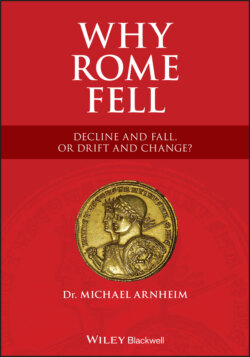Читать книгу Why Rome Fell - Michael Arnheim - Страница 45
What Polybius Actually Said
ОглавлениеMillar, claiming to be following the ancient historian Polybius (c. 200–c.118 BCE), maintained that a good deal of sovereignty was exercised by the Roman people. Here is what Polybius actually said: ὥστε πάλιν ἐκ τούτων εἰκότως ἄν τιν᾽ εἰπεῖν ὅτι μεγίστην ὁ δῆμος ἔχει μερίδα καὶ δημοκρατικόν ἐστι τὸ πολίτευμα. (“And so one might plausibly say that the people’s share in the government is the greatest, and that the constitution is a democratic one.”) (Polyb. 6.14.)
The key word here is εἰκότως (eikotos), meaning “in all likelihood, reasonably,” which comes from the verb eoike (it seems). The point Polybius is making is not that the constitution was democratic but that, if one looked at the people’s share in isolation, it might seem that their share was the greatest. Moreover, this passage is sandwiched between two other passages indicating that the Roman constitution was not a democracy but a mixed constitution.
It has to be remembered that Polybius was a Greek who had come to Rome as a hostage but stayed on and hobnobbed with some leading senators. His analysis of the Roman Republican constitution belongs to a well-known Greek genre going back to Plato and Aristotle and earlier writers. He classified the Roman constitution as mixed: a combination of monarchy, aristocracy, and democracy. The two consuls he identified as the monarchical element, which of course is arrant nonsense as the whole idea of the consulate was to prevent power from being concentrated in the hands of a single person. Polybius identified the Senate as the aristocratic element, which was fair enough, considering not only its elite composition but also the fact that it controlled all the finances, had jurisdiction over all serious crimes, and was in control of foreign affairs. “After this,” writes Polybius, “we are naturally inclined to ask what part in the constitution is left for the people.” As the people, through the popular assemblies, elected all office-holders, voted on laws, and decided questions of war and peace, he concludes with the sentence as quoted in Greek above. But he adds that, while the Senate must respect the people’s wishes, “…the people must be submissive to the senate and respect its members both in public and in private.” (Polybius 6.17.) So, it would be quite wrong to read Polybius as saying that Rome was a democracy. It is quite clear that he classified it as having a mixed constitution or government.
As a Greek writing in Greek for a Greek readership, Polybius’s interest in Roman government is heavily influenced by the long Greek tradition of classifying constitutions in a formalistic or schematic way. That is why it is hardly coincidental that, as an adulator of Rome, Polybius should have chosen to classify its constitution as mixed, the form that Aristotle, among others, considered to be the best and stablest form of government. Polybius’s interest in the actual operation of the Roman constitution in practice was minimal.
Millar, as paraphrased by Rogers, opines that, “At the center of the practice of Roman politics was not the Roman patron (patronus) imposing his will upon a client, but rather the orator, addressing the crowd in the Roman forum.” See above for a discussion on patronage. But what about the idea that politics in the republic was all about orators persuading voters in debate?
